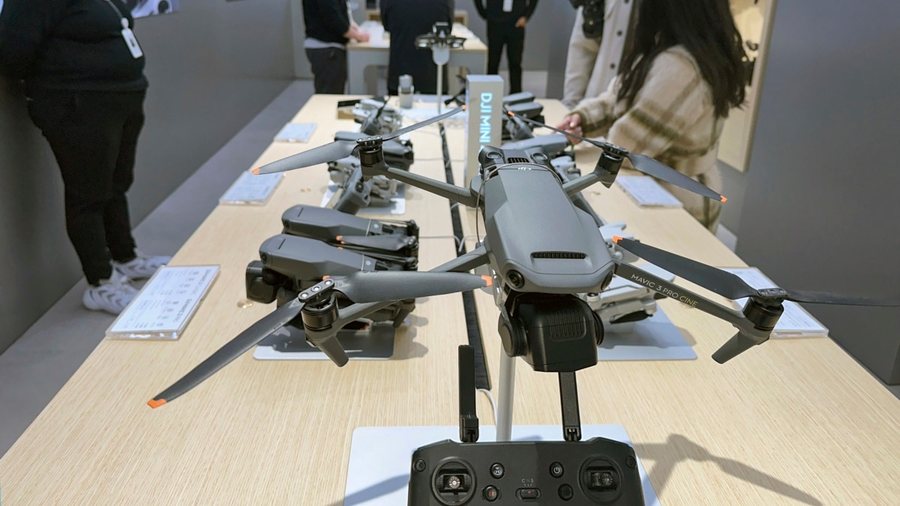
The economic and technological rivalry between the United States and China has already appeared in the drone market, where Chinese brands are dominant.
US lawmakers are considering banning further trade in drones by two Chinese companies, arguing the devices could be used to spy on Americans and that low-cost models are hurting the US drone industry.
A defense bill, approved by Congress last week, aims to ban the sale of drones manufactured by DJI Technology and Autel Robotics, if the results of a study show that they pose a risk to US national security.
But American users, from law enforcement officers to farmers to surveyors to the film industry, depend on drones made in China, mostly by DJI.
LEGISLATORS: DRONES A THREAT TO NATIONAL SECURITY
Republican lawmaker Elise Stefanik, who represents New York and has been President-elect Donald Trump's pick for the United States ambassador to the United Nations, has led efforts in the House of Representatives to stop further trade in Chinese drones, saying Americans have become too dependent on them.
"It is strategically irresponsible to allow communist China to be our drone factory," she argued.
The use of drones in everyday life prompted Republican Sen. Rick Scott, who represents Florida, to push Congress to limit the purchase of Chinese drones for federal agencies. Those restrictions were included in a bill signed by President Joe Biden last year.
Senator Scott has compared Chinese drones to spy balloons that can "collect data or carry harmful payloads" across America, posing risks to military bases, critical infrastructure and natural resources.
DJI DRONES DOMINATE THE AMERICAN MARKET
The DJI firm, named in the bill, is China's most popular drone brand. This company 'has the lion's share' of the global drone market and is the dominant player in the US market.
This company's drones are used by emergency teams to detect victims in disasters, surveyors, pest control offices and the film industry.
Founded in 2006 and based in the southern Chinese city of Shenzhen, DJI manufactures equipment that is known for its affordable prices and high quality. Its drones are also used on the battlefield in Ukraine by both sides, even though DJI does not make military drones.
With the deterioration of relations between the United States and China, the issue of DJI drones has been under scrutiny. The US government has placed the company on several blacklists, citing human rights concerns as well as suspected ties to the Chinese military. DJI has denied any wrongdoing and has sued the Pentagon for designating it as a Chinese military company.
US customs officials have blocked some shipments of 'DJI' due to concerns that the products may have been made with forced labour. 'DJI' called the case "a misunderstanding related to customs procedures".
DJI has also expressed concern over the inclusion of the drone issue in the defense bill, saying that this does not allow the company to defend itself. The firm called for a "right to respond to any findings" to be provided by Congress.
Users say Chinese drones cannot be easily replaced
North Carolina farmer Russell Hedrick uses drones to drop fertilizer on his fields of corn, beans and wheat. This costs him much less than it would if he used a ground vehicle. A delivery drone costs $35,000, while a ground vehicle for dumping chemical fertilizers costs $250,000, he said.
As a volunteer for rescue operations, Mr. Hedrick uses drones to find people trapped by landslides and other types of drones to deliver water and food to those stranded, which he did after Hurricane Helene.
"It's not that I don't like American drones, but I can't compare them to DJI drones in terms of reliability and ease of use," Mr. Hedrick said. "American drones are not as good as DJI's, and they cost twice as much."
At the Interior Department, the ban on foreign-made drones has resulted in a "loss of opportunities to collect data on the landscape, natural and cultural resources, wildlife and infrastructure," according to an official report published in September.
Michael Robbins, president and CEO of AUVSI, an organization that defends the right to use unmanned vehicles such as drones, opposes their immediate ban. The organization has urged the government to support the domestic drone manufacturing industry through investment so that it can compete with Chinese production in both capacity and cost. VOA (A2 Televizion)











